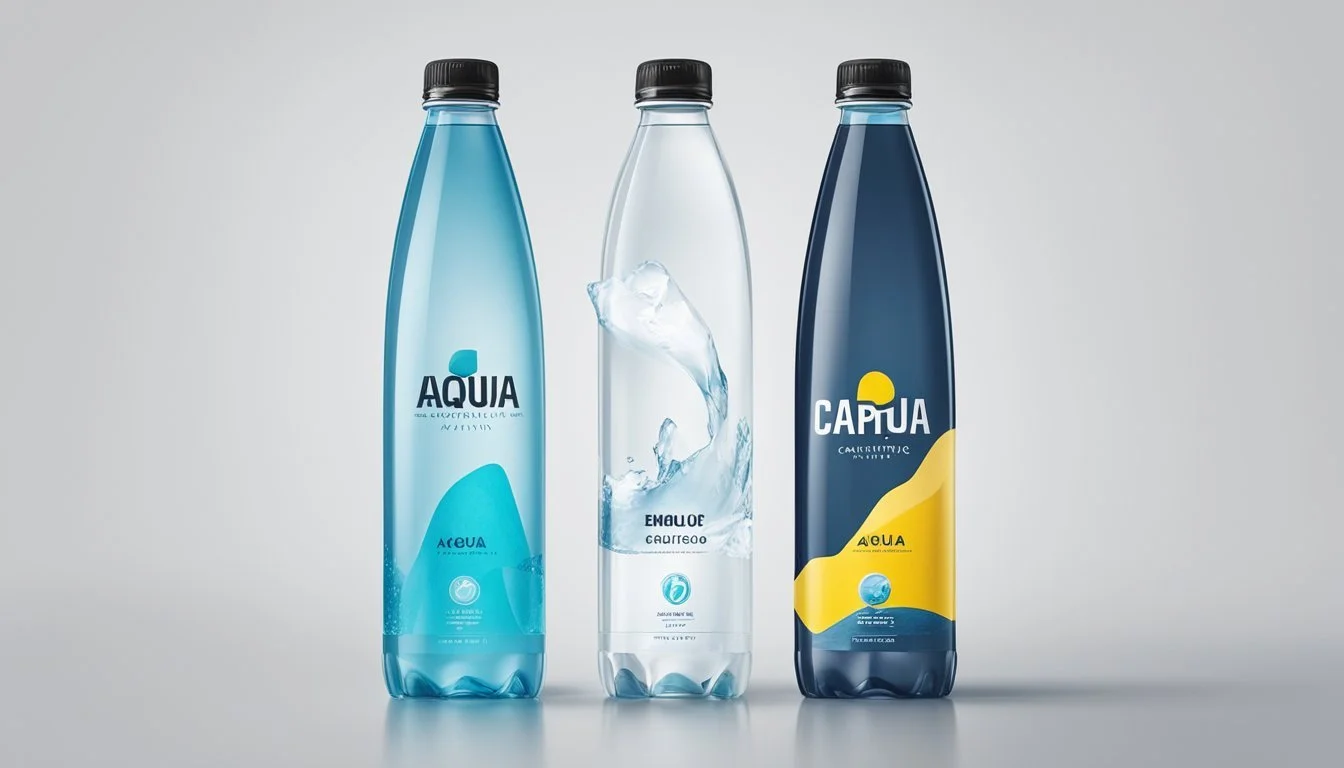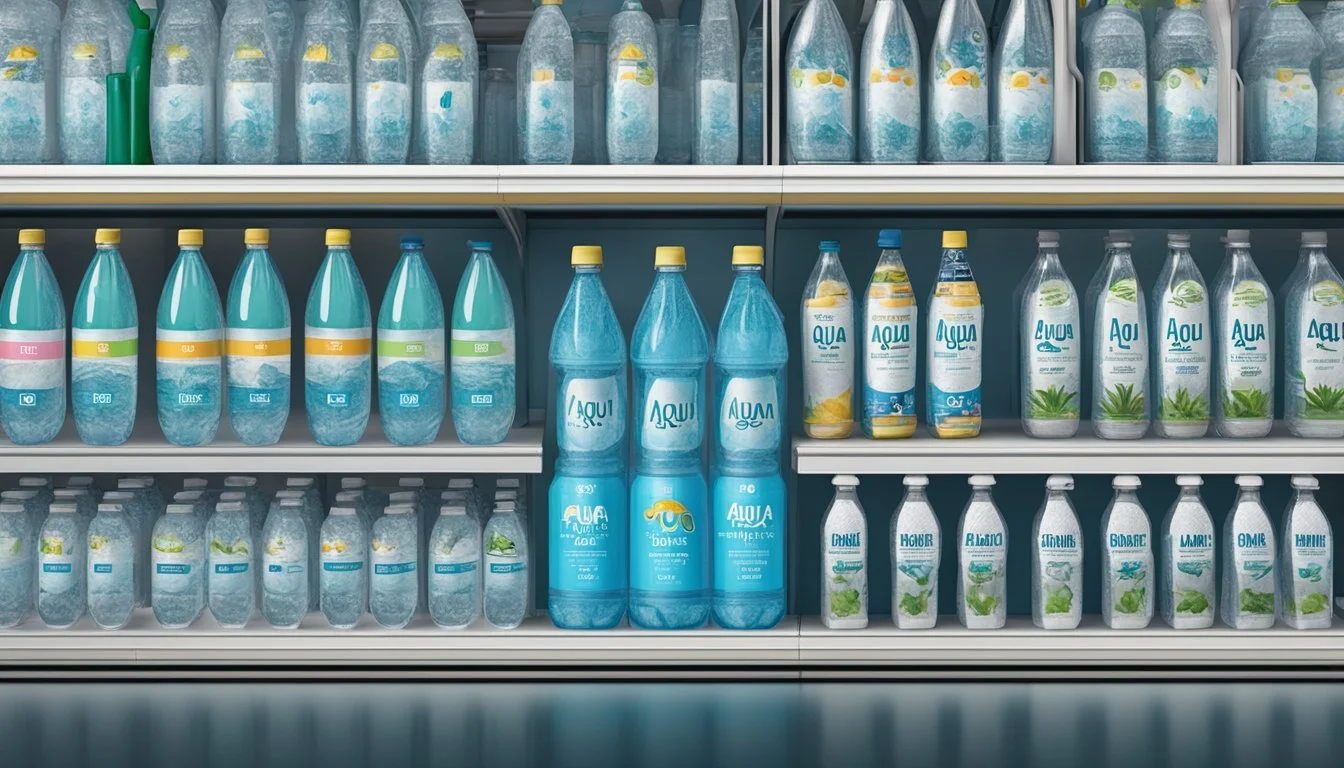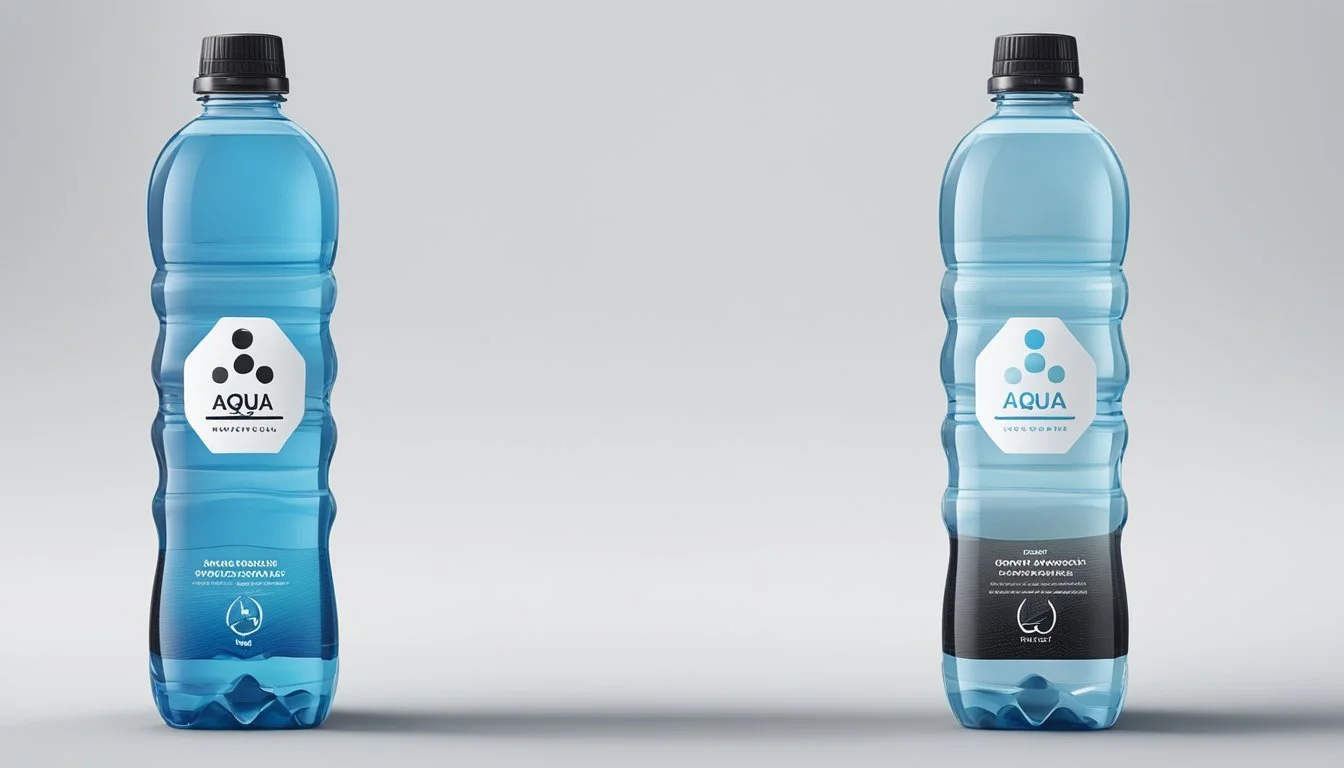Aqua Carpatica vs. Blk
Comparing Quality and Taste
Aqua Carpatica and blk. Water have carved out distinct niches in the premium bottled water market. Aqua Carpatica, hailing from the Carpathian Mountains, is celebrated for its purity and natural mineral content. With no detectable nitrates, it offers a reassuringly clean hydration option. Priced reasonably at 65p for 500ml for the Still Natural Mineral Water, it promises both quality and affordability.
blk. Water, known for its striking black appearance due to the inclusion of fulvic trace minerals, certainly captures attention. This distinctive beverage claims potential health benefits and challenges conventional expectations of bottled water aesthetics. Its unique composition sets it apart, making it a conversation starter among health enthusiasts and curious consumers.
When comparing Aqua Carpatica to blk. Water, Aqua Carpatica stands out for its purity and health benefits, while blk. Water draws interest with its bold look and innovative ingredients. Both brands offer something unique, catering to different preferences and hydration needs. As the bottled water market evolves, these two brands exemplify how innovation and natural quality can coexist.
Origin and Source
Exploring the origins of bottled water brands is crucial to understanding their quality. The source of the water plays a significant role in determining its taste and purity.
Aqua Carpatica: Carpathian Springs
Aqua Carpatica is sourced from the Carpathian Mountains in Romania. Nestled within ancient forests, these mountains offer pristine natural springs. The water undergoes natural filtration as it travels through layers of volcanic rock and mineral-rich soil.
The result is pure, nitrate-free mineral water. Aqua Carpatica capitalizes on the purity of this source, emphasizing its low sodium content and high mineral concentration, making it a sought-after choice for consumers.
Blk: Natural Spring Water
Blk water, on the other hand, comes from natural springs in North America. The water is infused with fulvic minerals, which give it a distinct black color. Sourced from deep underground aquifers, Blk water undergoes a meticulous purification process.
The infusion of fulvic minerals not only imparts a unique color but also adds trace minerals that may offer additional health benefits. This combination differentiates Blk from conventional spring waters available on the market.
Composition and Purity
Aqua Carpatica and Blk bottled water offer distinct compositions and purity levels. These differences can be significant when choosing a water that suits your needs and preferences.
Mineral Content Analysis
Aqua Carpatica sources its water from springs in the Carpathian Mountains, offering a nitrate-free composition. It is rich in electrolytes, with notable amounts of calcium, magnesium, and potassium. This natural mineral water maintains a balanced pH level around 7.8, ensuring it stays on the slightly alkaline side. The presence of bicarbonate helps to neutralize acidity in the body, promoting better overall hydration.
Blk water is distinguished by its black color, which comes from the addition of fulvic and humic acids. These acids naturally carry a host of minerals and electrolytes, including calcium and magnesium. Despite its unique color, Blk maintains a neutral taste and a balanced pH level close to 8. The fulvic acid also aids in the absorption of other nutrients which can be beneficial for those seeking enhanced hydration and nutrient intake.
Evaluating Purity Standards
Aqua Carpatica prides itself on its natural purity. Harvested from untainted springs, it is notable for being one of the few bottled waters with zero nitrates. This level of purity ensures that contaminants found in many industrial areas are absent. The water is usually packaged in conditions that preserve its natural cleanliness and freshness, offering consumers a highly pure and clean drinking experience.
Blk water also adheres to stringent purity standards. The fulvic and humic acids not only add minerals but also have properties that can remove toxins, contributing to the water's purity. The brand emphasizes its clean processing methods, ensuring that the final product remains untainted by harmful substances. While Blk’s unique appearance might cause some hesitation, its purification process ensures a safe and pure potable water option.
Health and Hydration Benefits
Comparing Aqua Carpatica and blk. Water, both brands highlight distinct benefits regarding hydration and nutritional contributions. Each offers unique mineral compositions that contribute to overall wellness and hydration efficacy.
Hydration and Electrolyte Replenishment
Aqua Carpatica Still Natural Mineral Water, sourced from the Carpathian Springs in Romania, prioritizes purity and natural mineral content. It is nitrate-free and low in sodium, making it a suitable option for babies and individuals seeking balanced hydration.
In contrast, blk. Water stands out due to its unique appearance and inclusion of fulvic trace minerals, which may aid in hydration. However, its efficacy in replacing electrolytes remains under discussion in scientific circles.
Aqua Carpatica provides essential electrolytes such as calcium and magnesium that aid in muscle function and hydration. blk. Water's fulvic acid content can also support electrolyte replenishment, but the exact benefits compared to traditional mineral waters are less clear.
Nutritional Contributions to Wellness
Aqua Carpatica offers valuable nutrients like calcium and magnesium, crucial for bone health and metabolic functions. The low sodium content ensures it supports heart health without adding excess sodium to the diet. Its nitrate-free nature further positions it as a health-conscious choice.
Meanwhile, blk. Water contains fulvic acid, believed to assist in nutrient absorption and detoxification. The infusion of fulvic trace minerals sets it apart, but claims concerning its comprehensive health benefits lack extensive scientific validation.
In terms of practical benefits, Aqua Carpatica's blend of essential minerals supports everyday wellness, whether it's aiding in hydration, muscle function, or bone health. blk. Water appeals with its novel content, offering a different set of possible benefits centered around trace minerals and detox support.
Taste Profile Comparison
Aqua Carpatica and Blk bottled waters offer distinct taste experiences characterized by their unique sources and mineral content. This section explores the sensory differences and consumer preferences between these two brands.
Sensory Analysis
Aqua Carpatica is known for its naturally soft and crisp taste. It has a refreshing quality due to its low mineral content, particularly being nitrate-free and low in sodium. Many consumers report a clean finish with no aftertaste, enhancing its appeal.
Blk Water, in contrast, stands out with its unique fulvic trace mineral content, giving it a distinctive, slightly earthy flavor. It has a bold, full-bodied profile that some describe as more robust compared to typical bottled waters. This difference may be more noticeable to those with a keen palate for mineral complexities.
Water Taste Preference
Consumer preferences often highlight Aqua Carpatica’s crisp and refreshing profile. It appeals to those who prefer a subtle, pure taste without lingering flavors. The absence of aftertaste makes it a favorite for many, especially when hydration is key.
Blk Water’s richer flavor profile attracts a niche audience. Its earthy taste and unique mineral content provide a novel experience for adventurous drinkers. Some appreciate its distinctive character, while others may find it less appealing compared to the more neutral taste of traditional bottled water brands.
Environmental Impact and Sustainability
Both Aqua Carpatica and Blk bottled water brands have distinct approaches to environmental impact and sustainability, particularly in terms of packaging and natural resource usage.
Packaging and Recycling Options
Aqua Carpatica primarily uses plastic bottles that are recyclable, positioning itself within the sustainable packaging trend. However, compared to glass bottles, plastic has a higher environmental footprint, although it is more convenient for consumers due to its light weight and durability.
In contrast, Blk uses a mix of plastic and glass bottles. Glass bottles are often seen as a more sustainable option because they are 100% recyclable and can be reused multiple times without degradation in quality. Despite their higher transportation energy costs due to weight, glass bottles minimize long-term environmental damage associated with plastic waste.
Natural Resource Management
Aqua Carpatica sources its water from naturally nitrate-free springs, implying minimal contamination and treatment processes. This method conserves natural resources by reducing the need for purification and chemical treatment, thus having a lower environmental impact.
Blk, on the other hand, infuses its water with fulvic minerals, extracted from ancient plant deposits. While this enhances the water’s benefits, the extraction process could potentially disrupt ecosystems if not managed sustainably. Ensuring sustainable extraction practices is crucial to minimizing ecological disruption and maintaining natural resources for future use.
Market Presence and Consumer Information
Understanding where and how you can purchase Aqua Carpatica and Blk, as well as comparing their prices, is crucial for consumers deciding between these two bottled water brands.
Availability and Retail Options
Aqua Carpatica is widely available in the USA and UK. In the USA, it is often found in supermarkets like Whole Foods Market and online platforms such as Amazon. UK consumers can purchase it at stores like Harrods and via online retailers like Ocado. Blk, known for its distinctive black color, is also available through major online retailers like Amazon and can be found in select health food stores and specialty shops.
Price Comparisons and Value
Aqua Carpatica often commands a premium due to its natural nitrate-free composition. In the USA, a 6-pack of 1L bottles generally costs around $10-15 on Amazon. In the UK, it is priced similarly, with added luxury status at retailers like Harrods. Blk, despite its unique selling point of fulvic-enhanced mineral water, tends to be slightly cheaper, with prices around $9-12 for a similar 6-pack on Amazon. Consumers often perceive Aqua Carpatica as offering better value due to its natural purity, while Blk attracts those interested in novel and trendy wellness products.
Comparative Analysis of Other Brands
When comparing Aqua Carpatica and Blk water to other bottled water brands, several factors like mineral content, purification methods, and price emerge as critical evaluation points. Some brands distinguish themselves with unique selling points, while others focus on offering premium hydration solutions.
Main Competitors in the Market
Several well-established brands provide stiff competition in the bottled water market. Dasani and Aquafina, both owned by major beverage corporations, are leaders offering purified water but lack the mineral-rich profiles of premium brands.
Evian and Fiji Water stand out with their high mineral content sourced from natural aquifers. On the premium side, Voss and Acqua Panna target consumers seeking luxury and purity, emphasizing their naturally sourced waters and elegant packaging.
Smartwater and Essentia focus on enhanced hydration, utilizing vapor distillation and ionization processes. Meanwhile, Arrowhead serves as a reliable source of spring water in various regions. These brands often highlight their unique purification processes or natural origins to attract health-conscious consumers.
Specialty and Alkaline Waters
The market also features specialty waters targeting specific health benefits. Core Hydration and Essentia boast higher pH levels, promoting alkaline water's potential health benefits. This appeals to consumers looking for water that may help balance body acidity.
Flow and Icelandic Glacial emphasize their pristine sources and sustainability. Flow offers mineral-rich water in eco-friendly packaging, addressing environmental concerns. Icelandic Glacial is notable for its naturally alkaline water from Icelandic springs.
For a distinctive hydration experience, blk. Water with its fulvic acid infusion, provides trace minerals in a striking black water presentation. Such specialty waters cater to niches within the market, attracting customers who prioritize unique health benefits and innovative features in their hydration choices.
Consumer Experience and Feedback
Consumers often share their experiences and perspectives on bottled water products. From customer reviews to expert opinions, the feedback on Aqua Carpatica and Blk water offers insights into their quality and appeal.
Customer Reviews and Ratings
Aqua Carpatica is praised for its naturally nitrate-free quality and low sodium levels. Many consumers appreciate the lack of harmful contaminants and the crisp, clean taste. One reviewer highlighted its freshness compared to other bottled waters, making it a preferred choice for daily hydration, including drinking it with tea and coffee. The TDS (Total Dissolved Solids) level is low, which some customers feel contributes to its pure taste.
Blk water receives mixed reviews due to its unique appearance and taste. Some consumers enjoy the novelty of the deep obsidian hue and the health benefits of fulvic trace minerals. However, others find its flavor slightly off-putting and the high price a potential drawback. Despite these differing opinions, Blk water maintains a niche customer base intrigued by its distinctive look and purported health benefits.
Expert Opinion and Endorsements
Experts commend Aqua Carpatica for its natural mineral profile and compliance with low nitrate levels, which align with various health standards. It has been endorsed for being a healthier alternative to other bottled waters, especially for individuals concerned about high mineral content in their drinks. The consistently low sodium level further elevates its status among health-conscious consumers.
Blk water garners attention from health and wellness experts due to its infusion with fulvic acid. This has prompted discussions about its potential health benefits, including improved hydration and mineral absorption. Despite some skepticism about the efficacy of such claims, Blk has been endorsed by wellness influencers who emphasize the unique selling points of this premium-priced water.
Both Aqua Carpatica and Blk water provide distinct experiences, influenced by their mineral content, taste profiles, and price points, shaping consumer preferences and expert opinions alike.
Regulatory Compliance and Certifications
Both Aqua Carpatica and Blk bottled waters adhere to stringent regulatory requirements and maintain certifications to ensure product safety and quality.
Quality Assurance and Standards
Aqua Carpatica prioritizes natural purity, being nitrate-free and having low sodium levels. This brand follows the regulations set by the United States Food and Drug Administration (FDA) and the State Department of Public Health, ensuring contaminants remain below prescribed limits.
Blk water also complies with stringent standards, particularly focusing on maintaining the purity despite its distinctive black color, enriched with fulvic minerals. Both brands undergo rigorous testing to ensure they meet all applicable regulations and standards for bottled water purity and safety.
Health and Safety Certifications
Aqua Carpatica's certifications highlight its commitment to consumer health. Known for its naturally nitrate-free water, this brand holds certifications confirming the absence of harmful chemicals and aligning with health safety certifications such as ISO 22000.
Blk water also boasts several important certifications. It conforms to FDA regulations and is often scrutinized for its safety due to its unique color and composition. Certifications help consumers trust that the product is free of harmful contaminants and safe for regular consumption.
Conclusion
Aqua Carpatica and Blk both offer unique features that cater to different preferences and needs.
Aqua Carpatica is renowned for its purity, sourced from the Carpathian Springs. It boasts a naturally nitrate-free and low sodium content, appealing to those conscious of their nutritional intake.
Blk Water stands out with its distinctive black color, attributed to its infusion of fulvic trace minerals. This characteristic might attract consumers looking for something unusual or potentially rich in minerals.
Taste can also be a deciding factor. Aqua Carpatica is noted for its clean, crisp flavor without any aftertaste. Blk Water, on the other hand, has an earthy taste that some may find intriguing while others might not prefer.
Availability and Price are important considerations. Aqua Carpatica prides itself on delivering a premium product, which might reflect in its price range. Blk Water’s unique proposition could also come with a higher price tag but may vary depending on the market.
Health Benefits differ too. Aqua Carpatica emphasizes its absence of nitrates and low sodium levels. Blk Water claims benefits from fulvic acid, potentially supporting nutrient absorption and detoxification.
Each water brand has distinct qualities. Aqua Carpatica focuses on purity and traditional mineral content. Blk Water offers a visually unique product with added minerals. Preferences in taste, health focus, and aesthetic appeal will guide the choice between these two.







